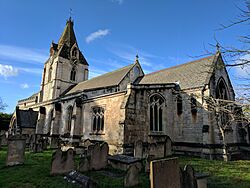Church of St Edmund, Mansfield Woodhouse facts for kids
Quick facts for kids St Edmunds |
|
|---|---|
| St Edmund King & Martyr | |

Church of St Edmund, Mansfield Woodhouse
|
|
| Lua error in Module:Location_map at line 420: attempt to index field 'wikibase' (a nil value). | |
| OS grid reference | SK 54017 63212 |
| Location | Church Street, Mansfield Woodhouse, Nottinghamshire |
| Denomination | Church of England |
| Churchmanship | Central |
| History | |
| Status | Parish church |
| Dedication | Edmund the Martyr |
| Architecture | |
| Functional status | Active |
| Heritage designation | Grade II* listed |
| Designated | 28 January 1957 |
| Architectural type | Church |
| Style | Gothic |
| Groundbreaking | c. 1190 |
| Specifications | |
| Materials | Stone, slate / lead roof |
| Administration | |
| Parish | Mansfield Woodhouse |
| Deanery | Mansfield |
| Archdeaconry | Newark |
| Diocese | Southwell and Nottingham |
| Province | York |
The Church of St Edmund is a special church located in Mansfield Woodhouse, a town in Nottinghamshire, England. People also call it St Edmund's or St Edmund King & Martyr. It's an active church that belongs to the Church of England.
This church is the main one for its area, working with another church, Church of St Chad, Pleasley Vale. St Edmund's is a very important building. It is listed as a Grade II* listed building on the National Heritage List for England. This means it is a building of special historical interest.
St Edmund's Church also works closely with St Edmund's C of E Primary School. The school moved to a new site in the 1980s. Its old building, near the church, is still standing. It is also a listed building. The Turner Memorial Hall is across from the church. It serves as the church hall and a community center. It is also the home for St Edmund's scout group.
History of St Edmund's Church
The church is not mentioned in a very old book called the Domesday Book. However, it is thought that a wooden church might have been here in the 11th century. This early church may have been destroyed by a fire in 1180.
A new church was built around 1190. It was made partly of wood and partly of local limestone. In 1304, a big fire destroyed the village and much of this church. Work to rebuild the church started soon after, in 1306. A special wall hanging in the church shows the village and church burning. This artwork was made in 2004 to remember the fire.
The church was rebuilt again between 1804 and 1810. Then, it had a major restoration from 1847 to 1850. For a long time, people thought a famous architect named George Gilbert Scott did this work. However, later studies showed that W B Moffatt and T C Hine were the architects.
Outside the Church
The church is surrounded by a churchyard on all sides. There are many old trees and stone walls around it. The wall facing Church Street is also a listed structure.
Inside the churchyard, you can find three old gravestones. There is also a stone coffin, called a sarcophagus. All of these are listed as important historical items. A memorial for the First World War is located across from the church. It stands on Priory Road, at the entrance to Yeoman Hill Park. This memorial is also a listed structure.
Gallery
See also
- Grade I listed buildings in Nottinghamshire
- Grade II* listed buildings in Nottinghamshire
- Listed buildings in Mansfield (outer areas)
 | James B. Knighten |
 | Azellia White |
 | Willa Brown |







